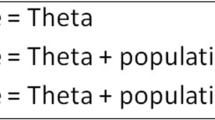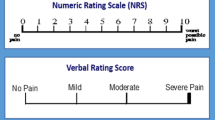Abstract
Purpose
Pain catastrophizing and acceptance represent distinct but interrelated constructs that influence adaptation to chronic pain. Clinical and laboratory research suggest that higher levels of catastrophizing and lower levels of acceptance predict worse functioning; however, findings have been mixed regarding which specific outcomes are associated with each construct. The current study evaluates these constructs in relation to pain, affect, and functioning in a treatment-seeking clinical sample.
Method
Participants included 249 adult patients who were admitted to an interdisciplinary chronic pain rehabilitation program and completed measures of pain and related psychological and physical functioning.
Results
Hierarchical multiple regression analyses indicated that pain catastrophizing and acceptance both significantly, but differentially, predicted depressive symptoms and pain-related negative affect. Only pain catastrophizing was a unique predictor of perceived pain severity, whereas acceptance uniquely predicted pain interference and performance in everyday living activities. There were no significant interactions between acceptance and catastrophizing, suggesting no moderation effects.
Conclusion
Findings from the current study indicate a pattern of results similar to prior studies in which greater levels of catastrophic thinking is associated with higher perceived pain intensity whereas greater levels of acceptance relate to better functioning in activities despite chronic pain. However, in the current study, both acceptance and catastrophizing were associated with negative affect. These relationships were significant beyond the effects of clinical and demographic variables. These results support the role of pain acceptance as an important contribution to chronic pain-related outcomes alongside the well-established role of pain catastrophizing. Results are limited by reliance on self-report data, cross-sectional design, and low racial/ethnic diversity.
Similar content being viewed by others
References
Roth RS, Geisser ME, Williams DA. Interventional pain medicine: retreat from the biopsychosocial model of pain. Transl Behav Med. 2012;2:106–16.
Quartana PJ, Campbell CM, Edwards RR. Pain catastrophizing: a critical review. Expert Rev Neurother. 2009;9:745–58.
Jensen MP, Turner JA, Romano JM. Changes in beliefs, catastrophizing, and coping are associated with improvement in multidisciplinary pain treatment. J Consult Clin Psychol. 2001;69:655–62.
Keefe FJ, Brown GK, Wallston KA, Caldwell DS. Coping with rheumatoid arthritis pain: catastrophizing as a maladaptive strategy. Pain. 1989;37:51–6.
McCracken LM, Vowles KE, Eccleston C. Acceptance of chronic pain: component analysis and a revised assessment method. Pain. 2004;107(1–2):159–66.
McCracken LM. Learning to live with the pain: acceptance of pain predicts adjustment in persons with chronic pain. Pain. 1998;74:21–7.
McCracken LM, Eccleston C. Coping or acceptance: what to do about chronic pain? Pain. 2003;105:197–204.
McCracken LM, Eccleston C, Bell L. Clinical assessment of behavioral coping responses: preliminary results for a brief inventory. Eur J Pain. 2005;9(1):69–78.
Vowles KE, McCracken LM, Eccleston C. Patient functioning and catastrophizing in chronic pain: the mediating effects of acceptance. Health Psychol. 2008;27(2 Suppl):S136–43.
Baranoff J, Hanrahan SJ, Kapur D, Conoor JP. Acceptance as a process variable in relation to catastrophizing in multidisciplinary pain treatment. Eur J Pain. 2013;17(1):101–10.
de Vries HJ, Reneman MF, Groothoff JW, Geertzen JHB, Brouwer S. Workers who stay at work despite chronic nonspecific musculoskeletal pain: do they differ from workers with sick leave? J Occup Rehabil. 2012;22(4):489–502.
Chiros C, O’Brien WH. Acceptance, appraisals, and coping in relation to migraine headache: an evaluation of interrelationships using daily diary methods. J Behav Med. 2011;34(4):307–20.
Sturgeon JA, Zautra AJ. Psychological resilience, pain catastrophizing, and positive emotions: perspectives on comprehensive modeling of individual pain adaptation topical collection on psychiatric management of pain. Curr Pain Headache Rep. 2013;17(3):317.
Ramírez-Maestre C, Esteve R, López-Martínez AE. Fear-avoidance, pain acceptance and adjustment to chronic pain: a cross-sectional study on a sample of 686 patients with chronic spinal pain. Ann Behav Med. 2014;48(3):402–10.
Esteve R, Ramírez-Maestre C, López-Martínez AE. Adjustment to chronic pain: the role of pain acceptance, coping strategies, and pain-related cognitions. Ann Behav Med. 2007;33(2):179–88.
de Boer MJ, Steinhagen HE, Versteegen GJ, Struys MMRF, Sanderman R. Mindfulness, acceptance and catastrophizing in chronic pain. PLoS One. 2014;9(1):e87445.
Poppe C, Crombez G, Devulder J, Hanoulle I, Vogelaers D, Petrovic M. Personality traits in chronic pain patients are associated with low acceptance and catastrophizing about pain. Acta Clin Belg. 2011;66(3):209–15.
Richardson EJ, Ness TJ, Doleys DM, Baños JH, Cianfrini L, Richards JS. Depressive symptoms and pain evaluations among persons with chronic pain: catastrophizing, but not pain acceptance, shows significant effects. Pain. 2009;147(1–3):147–52.
Gillanders DT, Ferriera NB, Bose S, Esrich T. The relationship between acceptance, catastrophizing and illness representations in chronic pain. Eur J Pain. 2013;17(6):893–902.
Kratz AL, Davis MC, Zautra AJ. Pain acceptance moderates the relation between pain and negative affect in female osteoarthritis and fibromyalgia patients. Ann Behav Med. 2007;33(3):291–301.
Richardson EJ, Ness TJ, Doleys DM, Baños JH, Cianfrini L, Scott RJ. Catastrophizing, acceptance, and interference: laboratory findings, subjective report, and pain willingness as a moderator. Health Psychol. 2010;29(3):299–306.
Crombez G, Eccleston C, Baeyens F, Eelen P. When somatic information threatens, catastrophic thinking enhances attentional interference. Pain. 1998;75(2–3):187–98.
Crombez G, Eccleston C, Van den Broeck A, Van Houdenhove B, Boubert L. The effects of catastrophic thinking about pain on attentional interference by pain: no mediation of negative affectivity in healthy volunteers and in patients with low back pain. Pain Res Manag. 2002;7(1):31–9.
Law M, Baptiste S, McColl M, Opzoomer A, Polatajko H, Pollock N. The Canadian Occupational Performance Measure: an outcome measure for occupational therapy. Can J Occup Ther. 1990;57(2):82–7.
Carpenter L, Baker GA, Tyldesley B. The use of the Canadian Occupational Performance Measure as an outcome of a pain management program. Can J Occup Ther. 2001;68(1):16–22.
Eyssen ICJM, Steultjens MPM, Oud TAM, Bolt EM, Maasdam A, Dekker J. Responsiveness of the Canadian Occupational Performance Measure. J Rehabil Res Dev. 2011;48(5):517–28.
Sullivan MLJ, Bishop SR, Pivik J. The Pain Catastrophizing Scale: development and validation. Psychol Assessment. 1995;7:524–32.
Osman A, Barrios FX, Kopper BA, et al. Factor structure, reliability, and validity of the Pain Catastrophizing Scale. J BehavMed. 1997;20:589–605.
Kroenke K, Spitzer RL, Williams JB. The PHQ-9: validity of a brief depression severity measure. J Gen Intern Med. 2001;16(9):606–13.
Blackwell TL, McDermott A. Test review: Patient Health Questionnaire – 9 (PHQ-9). Rehabil Couns Bull. 2014;57:246–8.
Kerns IV RD, Turk DC, Rudy TE. West Haven-Yale Multidimensional Pain Inventory (WHYMPI). Pain. 1985;23:345–56.
Verra ML, Angst F, Staal JB, Brioschi R, Lehmann S, Aeschlimann A, de Bie RA. Reliability of the Multidimensional Pain Inventory and stability of the MPI classification system in chronic back pain. BMC Musculoskelet Disord. 2012;13:155–63.
Craner J, Gilliam W, Sperry J. Rumination, magnification, and helplessness: how do different aspects of pain catastrophizing impact pain-related outcomes? Clin J Pain. 2015; doi:10.1097/AJP.0000000000000355.
Sullivan MJ, Lynch ME, Clark AJ. Dimensions of catastrophic thinking associated with pain experience and disability in patients with neuropathic pain conditions. Pain. 2005;113:310–5.
Kristiansen FL, Olesen AE, Brock C, Parisa G, Petrini L, Mogil JS, Drewes AM. The role of pain catastrophizing in experimental pain perception. Pain Pract. 2014;14:E136–45.
McCormick ZL, Gagnon CM, Caldwell M, Patel J, Kornfeld S, Atchison J, et al. Short-term functional, emotional, and pain outcomes of patients with complex regional pain syndrome treated in a comprehensive interdisciplinary pain management program. Pain Med. 2015;16:2357–67.
Townsend CO, Kerkvliet JL, Bruce BK, Rome JD, Hooten WM, Luedtke CA, Hodgson JE. A longitudinal study of the efficacy of a comprehensive pain rehabilitation program with opioid withdrawal: comparison of treatment outcomes based on opioid use status at admission. Pain. 2008;140:177–89.
Craner J, Sperry J, Evans M. Pain catastrophizing and outcomes of a 3-week comprehensive pain rehabilitation program: treatment mechanisms and maintenance of gains. Pain Med. 2016; doi:10.1093/pm/pnw070.
Vowles KE, McCracken LM, Eccleston C. Processes of change in treatment for chronic pain: the contributions of pain, acceptance, and catastrophizing. Eur J Pain. 2007;11:779–87.
Turner J, Sherman K, Anderson M, Balderson B, Cook A, Cherkin D. Catastrophizing, pain self-efficacy, mindfulness, and acceptance: relationships and changes among individuals receiving CBT, MBSR, or usual care for chronic back pain. Pain. 2015;16(4):S96.
Gagnon CM, Matsuura JT, Smith CC, Stanos SP. Ethnicity and interdisciplinary pain treatment. Pain Practice. 2014;14(6):532–40.
Thorne BE, Day ME, Burns J, Kuhajda MC, Gaskins SW, Sweeney K, McConley R, Ward LC, Cabbil C. Randomized trial of group cognitive behavioral therapy compared with a pain education control for low-literacy rural people with chronic pain. Pain. 2011;152:2710–20.
Author information
Authors and Affiliations
Corresponding author
Ethics declarations
Funding
No funding was received for this study.
Conflict of Interest
The authors declare that they have no conflicts of interest.
Ethical Approval
All procedures performed involving human participants were in accordance with the ethical standards of the institutional research committee and with the 1964 Helsinki Declaration and its later amendments or comparable ethical standards.
Informed Consent
Informed consent was obtained from all individual participants included in the study.
Disclosures
No financial disclosures.
Rights and permissions
About this article
Cite this article
Craner, J.R., Sperry, J.A., Koball, A.M. et al. Unique Contributions of Acceptance and Catastrophizing on Chronic Pain Adaptation. Int.J. Behav. Med. 24, 542–551 (2017). https://doi.org/10.1007/s12529-017-9646-3
Published:
Issue Date:
DOI: https://doi.org/10.1007/s12529-017-9646-3




